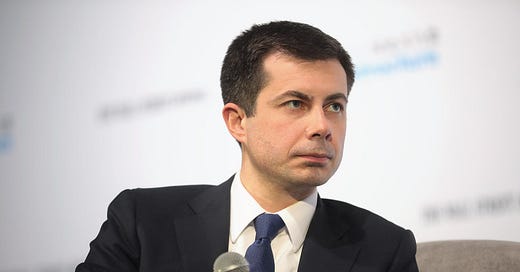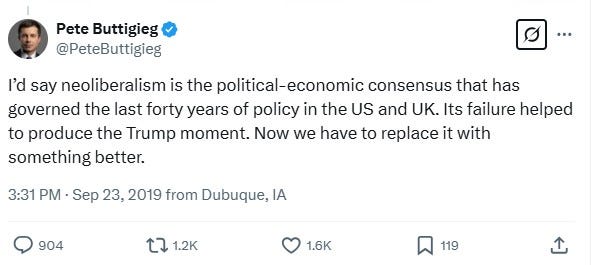Should This Be Pete Buttigieg's Message?
The case for Democrats to make neoliberalism the enemy.
From a campaign stop in Iowa months before the 2020 Democratic presidential primaries, Pete Buttigieg tweeted this during a Twitter Q&A with voters:
This concept deserves more attention. By acknowledging the Democrats' role in fueling neoliberalism, Buttigieg (or any other promising candidate) has a clear way to talk about the economic struggles that many Americans face.
In recent years, there’s been growing support on both the left and the right for moving away from the neoliberal global order. But its usage as a larger political messaging opportunity has failed to take hold. I think that’s a mistake.
When I say “neoliberal global order,” I’m talking about the system largely responsible for hollowing out the American middle class. It is the forty years of bipartisan policymaking that, as Buttigieg points out above, has contributed to the popularity of Donald Trump.
What’s even more surprising is that President Joe Biden, who campaigned on moving away from neoliberalism, rarely discussed it publicly. Before we examine how Biden’s “post-neoliberal project” succeeded and failed, we need to understand how neoliberalism took hold and caused so much damage.
Neoliberalism became the dominant political ideology during Ronald Reagan’s presidency in the 1980s. “Reaganomics” was based on a “trickle-down” theory and included tax cuts for the wealthy, government privatization, deregulation of corporate and financial institutions, free trade policies, weakening of workers’ unions, and cuts to social programs while skyrocketing defense spending.
When Bill Clinton took office in the 1990s, he embraced many of these same neoliberal policies. His administration continued Reagan’s welfare cuts and deregulated the banks. Clinton’s “New Democrats” were more aligned with Republican ideas of self-reliance and small government than the New Deal Democrats who had shaped the party in the past. One of Clinton’s most significant contributions to neoliberalism was signing the North American Free Trade Agreement (NAFTA) in 1994, which sent jobs overseas to places with cheaper labor and shut down American factories.
George W. Bush followed a similar neoliberal path. His tax cuts for the wealthy and corporations, along with deregulation, echoed Reaganomics. His administration expanded free trade agreements and continued privatization efforts that weakened public institutions like schools.
The defining moment of Bush’s presidency was the decision to invade Afghanistan and Iraq after 9/11. These wars embodied the neoliberal idea that private businesses could do government’s work better than the government itself. Companies like Blackwater and Halliburton received lucrative contracts, sometimes without competitive bidding. Dick Cheney, who had run Halliburton before becoming Vice President, was a major influence on the decision to invade Iraq. At times, private contractors outnumbered American troops. The war became a business opportunity for multinational corporations, enriching them at the expense of ordinary Americans.
When we talk about neoliberalism, it’s hard to overstate the role of globalization. In many ways, opening up global supply chains brought cheaper goods, new technologies, and increased market competition. But it did so at a grave cost to the life of the average American. A third of America’s manufacturing employment base was lost to overseas jobs between 2000 and 2010. Displaced workers were then forced to take low-wage service or gig economy jobs that came with weakened labor unions and protections. This largely hollowed out the American middle class and left local economies devastated.
Barack Obama, elected in 2008, was seen as a generational political talent with a bold vision for a more prosperous America. But the financial crisis of 2008, the result of neoliberal deregulation, forced him to focus largely on stabilizing the economy rather than pursuing progressive reforms. His response to the Great Recession included bailing out Wall Street and the auto industry while increasing regulation. The Affordable Care Act (ACA), one of his signature achievements, was a compromise that expanded healthcare coverage to millions but was also heavily influenced by insurance companies. Obama’s trade policies, like the Trans-Pacific Partnership (TPP), continued many neoliberal principles despite criticism from labor unions.
The Obama era was defined by a mandate for change that ultimately couldn’t break the deeply entrenched neoliberal status quo.
The bipartisan neoliberal consensus held up until backlash from the electorate reached a boiling point. Populist factions in both parties had been brewing, and in 2016, voters sent Donald Trump to the White House. Trump governed with populist rhetoric, yet his loyalties were to the corporate donor class who had become reliant on the preservation of the global neoliberal order.
When Biden took office in 2020, the political climate had shifted. His administration adopted policies that challenged neoliberalism, especially by supporting domestic manufacturing and labor unions. This led to praise from some on the left, including a video titled “Joe Biden’s Radical Legacy” by the pro-Sanders media outlet More Perfect Union. However, despite these successes, Biden’s social safety net agenda, “Build Back Better,” was stalled and ultimately killed in Congress. This bill, which would have invested heavily in programs like universal pre-K, paid family leave, housing assistance, and childcare, was seen as key to building a post-neoliberal system.
If only the Democrats had a charismatic, compelling messenger who hails from the industrial heartland and could amplify this project into a national vision?
By pointing to neoliberalism and offering a real alternative, someone like Pete Buttigieg could help make the case that these widespread American struggles have deep roots and can be addressed:
You’ve dumped years of savings into rent because the housing market is out of reach.
You’ve been told to work a job that pays $7.25/hour at Walmart when your parents and grandparents supported an entire family working in the trades.
You’ve watched as business after business downtown closes and is never replaced, yet the many corporate fast-food chains on the block have CEOs making billions.
You’ve been told success is getting as far away from your hometown as possible.
You’re working multiple jobs in a precarious economy and aren’t even considered a full-time employee or receiving benefits in any of them.
You’ve been assured by advertising that buying more things is the key to success, but you’ve never been lonelier or less happy.
These aren’t isolated problems—they’re the result of a system that politicians have rarely addressed honestly. Both parties are guilty of maintaining loyalty to corporate interests that benefit from upholding neoliberalism. Fixing the system won’t be easy; it will require a real coalition of leaders willing to take action. The first step is to clearly define the task at hand.





Can you send this to Pete? And all of the others?!!
And please, at the start of your articles,offer a plain and clear definition of "neoliberalism". This isn't a term that rolls off the tongues of regular Americans. I couldn't have told you what it was before reading the above, and it's still not a term I feel comfortable using. It's actually kinda misleading, with the word liberal as part of it!